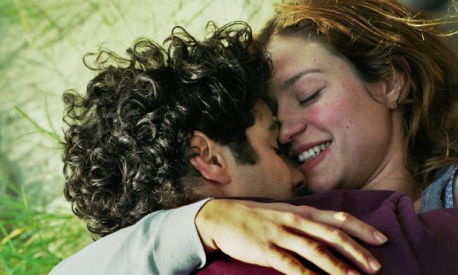
(Michael Haneke, 2012)
The deserved Palme d’Or winner at this year’s Cannes Film Festival, Michael Haneke’s latest, Amour, sees the provocative European auteur tackle the weighty issues of ageing, illness and the inevitability of death, delivering perhaps his most intimate and fearlessly perceptive film to date, even if it doesn’t quite eclipse his finest works. What he does here with film form – utilising the confined space of a single location as well as a careful use of sound to staggering effect, offer further proof that, much like his impeccably rendered protagonists, Haneke is growing old gracefully and bringing his unfettered filmmaking along with him.
Jean-Louis Trintignant and Emmanuelle Riva play Georges and Anne, an octogenarian couple living a cultivated life in Paris. Retired music teachers, the two live out a comfortable existence padded out by music and the occasional visit from their daughter Eva (Haneke regular Isabelle Huppert), a music teacher with financial worries. Opening with a sequence at a busy piano recital, with Haneke’s camera transfixed on an audience of gawping spectators (including our two protagonists) Amour – a perfect reconstruction of how we as an audience will similarly be watching the film, our collective attentions glued to the ensuing events, the crux of slowly begins to unravel to make way for a brutally honest portrait of physical degradation, the persistence of humanity and, most of all, love.
When a stroke leaves Anne paralysed down one side of her body, her legs rendered immobile and speech abilities dwindling, the relationship between her and her husband is put to the test, weathered on a daily basis by the improbabilities of dealing with an erratic and physically and mentally damaging illness.
Predominantly set in their cushy, echoey Paris apartment (save for the opening scene), the rest of the film slowly plays out through scenes powered by the shrinking of Georges and Anne’s world, with Georges taking on the tasks of caring for a wife who quickly begins to lose faith in whatever her now fraught future life has in store, bound to a wheelchair and reliant on the help of others. Never underplaying the difficulty of staying alive despite the failings of a weakening body, Haneke sculpts and sculpts his film until what’s left is a quietly meditative and emotionally raw journey whose destination is altogether painful and unavoidably traumatic.
Sensitive without giving in to schmaltz or easy conclusions, Amour is a triumph of simplicity and the naturalness of existence, a film that weaves together fine, naked performances from Trintignant and Riva (the latter especially deserves kudos for her incredibly brave portrayal) with a ravaged and sometimes aching examination of the challenges of dealing with the sudden effects of a seemingly random illness. Instead of surveying or even questioning the proper causes of Anne’s stroke, Haneke here focuses on the aftermath and intimate minutiae of both being in a long-term relationship and living with someone who has become so ingrained in one’s own sense of self. Georges and Anne are a couple dependent on one another for emotional and cultural nourishment; they listen to music together in their living room, they eat their meals and reminisce, telling stories from their respective childhoods, and this is described in early scenes full of gentle warmth, with the lead actors displaying an authentic chemistry. Every line in Haneke’s script is imbued by truth and sincerity, every scene a remarkable evocation of human relationships.
Similar to his master class in tension building – Hidden (Cache) – Haneke makes full use of a mostly static camera and a non-existent soundtrack, focusing wholeheartedly on diegetic sounds that are occasionally interrupted by short bursts of music, elements that augment this unbearably moving story. Sometimes cold, mostly perfect, Amour is a stunning film, one where, occasionally, the normalities and strictures of watching a film melt away, allowing an almost dumfounding and truthful distillation of reality and a slice of pure life to play out in devastatingly regimented form.








